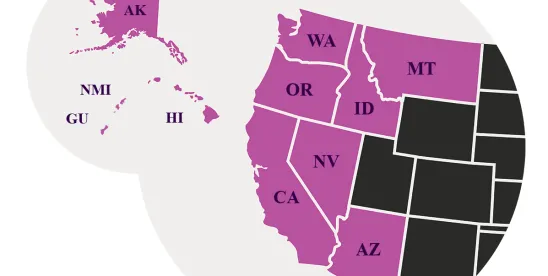The viability of Nationwide Permit (NWP) 12 – used to authorize certain actions during utility line construction – is uncertain. After a Montana judge vacated and enjoined the use of the permit nationwide for new oil and gas pipelines,[1] the U.S. Army Corps of Engineers (Corps) immediately appealed to the Ninth Circuit. In its May 22 brief on the motion to stay the district court’s order imposing the nationwide injunction, the Corps argued that the injunction violated due process and that the order lacked clarity. The Ninth Circuit refused to stay the matter, rejecting these arguments in its most recent order[2] because the Corps had not shown “sufficient likelihood of success on the merits” and “probability of irreparable harm.”
The next round of briefs are due late this summer (August 20 for appellants and September 21 for appellees), meaning that uncertainty will continue to cloud the use of the NWP for the months to come absent intervention by the U.S. Supreme Court.
This Ninth Circuit appeal comes on the heels of the federal district court’s amendment[3] of an earlier order in Northern Plains Resource Council v. U.S. Army Corps of Engineers, No. 4:19-cv-00044-BMM (D. Mont.) that vacated Nationwide Permit 12 because of a failure to properly assess Endangered Species Act (ESA) risks.
The NWP 12 is an approval issued by the Corps for utility line construction that simplifies the Clean Water Act (CWA) permitting process. Among the requirements is that applicants must demonstrate to the Corps that construction will have minimal impact on streams and wetlands. The original April 15 order drew criticism because the vacatur and nationwide injunction[4] went beyond simply stopping construction on the pipeline in question, potentially affecting allinfrastructure construction projects relying on the NWP 12 across the country.
According to the amended order from May 11, NWP 12 remains in place for non-pipeline construction activities and routine maintenance, inspection, and repair of existing permitted projects during remand, but is vacated for construction of new oil and gas pipelines. The Corps appealed the decision to the Ninth Circuit for emergency relief to both stay the order and to provide specificity as the boundaries of the district court’s order. Although the Ninth Circuit declined to stay the district court’s amended order, it established an expedited briefing schedule. Briefing was completed last week.
Among other things, the Corps argued in its brief that various aspects of the amended order were “vague or ambiguous” because (1) project proponents must now guess about how the injunction applies to mid-construction projects, and (2) the order exempts “routine” repair or maintenance on “existing NWP 12 projects” from the injunction, but fails to define “routine” or “existing NWP 12 projects.” Therefore, the Corps argued it is unclear whether repairs can take place on completed projects, projects in the middle of the NWP 12 verification process, or both. Additionally, pipeline repair often involves replacing entire sections of pipeline, so it remains ambiguous what kinds of repairs will be considered “routine.”
Further, the Corps argued that the district court failed to give prior notice of the scope of the injunction, thus projects proponents and other parties were unable to provide the district court with information about the breadth of the potential harms, which the Corps described as “anything but modest.” The Corps cited to intervenor-Defendant and amici briefs for specific examples of such harms; the American Petroleum Institute’s brief, for example, refers to approximately “75 pipelines in various stages of development,” that rely on the NWP 12 and a “one-year delay of just 11 of those projects would impose a cost of $1.9 billion.” Yet another brief from American Fuel & Petrochemical Manufacturers discussed the importance of permitted pipelines for petrochemical supply chains, including for manufacturing of “petrochemicals used to produce personal protective equipment … for the COVID-19 response, including N95 masks.”
The underlying lawsuit was filed by conservation and landowner groups challenging, among other things, the Corps’ decision to reissue the NWP 12 in 2017. The plaintiffs alleged in part that the Corps’ reissuance violated the ESA, the National Environmental Policy Act (NEPA), and the CWA. The ESA Section 7(a)(2)[5] requires: (1) federal agencies to ensure that their actions “do not jeopardize the continued existence of endangered or threatened species or destroy or adversely modify critical habitat,” and (2) “formal consultation” [6] with the U.S. Fish and Wildlife Service and/or National Marine Fisheries Service if the agency determines that an action “may affect” listed species or critical habitat.
The nationwide permit program[7] under Section 404 of the CWA groups certain construction activities in order to streamline the permitting process. The NWP 12 specifically authorizes[8] construction, maintenance, repair, and removal of utility lines and associated facilities in waters of the U.S., provided the activity does not cause a loss of greater than a half-acre of waters for each single and complete project. Applicants are required to evaluate the effects to the waters and make initial determinations about possible impacts, reporting adverse impacts to the Corps through a preconstruction notification (PCN).
But when the Corps reissued the NWP 12 in 2017, it determined that consultation with federal agencies was not necessary because General Permit Condition 18 would require consultation for specific projects. However, General Permit Condition 18 requires that the applicant, rather than the Corps, make the initial determination about the risks of a particular project. The applicant’s PCN notifies the Corps of the possible presence of protected species or habitat and that the activity “might” affect it.
In its original April 15 ruling, the district court found the Corps’ determination about consultation to be arbitrary and capricious. The court distinguished programmatic consultation – that is, ensuring that the process would protect species – from individual or project consultation – that is, a process directed at a specific project and water. The court further found that the Corps itself had an obligation to carry out programmatic consultation, especially since the Corps’ own description of the NWP 12 acknowledged that many dredge and fill projects had “resulted in direct and indirect impacts to wetlands, streams, and other aquatic sources.”
If you would like to know more about this case, the pending Ninth Circuit appeal, and its potential effects on your business or pending construction projects, please contact any member of the Schiff Hardin Environmental Group.
[1] The district court order expressly allows NWP 12 use for “non-pipeline construction activities and routine maintenance, inspection, and repair activities on existing NWP 12 projects.”
[2] https://news.bloomberglaw.com/environment-and-energy/fast-track-permits-stay-blocked-for-keystone-xl-other-pipelines
[3] https://www.reuters.com/article/us-usa-pipelines-court/montana-judge-upholds-ruling-that-canceled-keystone-xl-pipeline-permit-idUSKBN22O07T
[4] https://www.bloomberg.com/news/articles/2020-04-15/keystone-xl-pipeline-ruling-blocks-permit-for-river-crossings
[5] https://www.fws.gov/endangered/laws-policies/section-7.html
[6] https://www.govinfo.gov/content/pkg/CFR-2019-title50-vol11/xml/CFR-2019-title50-vol11-part402.xml#seqnum402.14
[7] https://www.epa.gov/cwa-404/nationwide-permits-chronology-and-related-materials-under-cwa-section-404
[8] https://www.govinfo.gov/content/pkg/FR-2017-01-06/pdf/2016-31355.pdf



 />i
/>i

